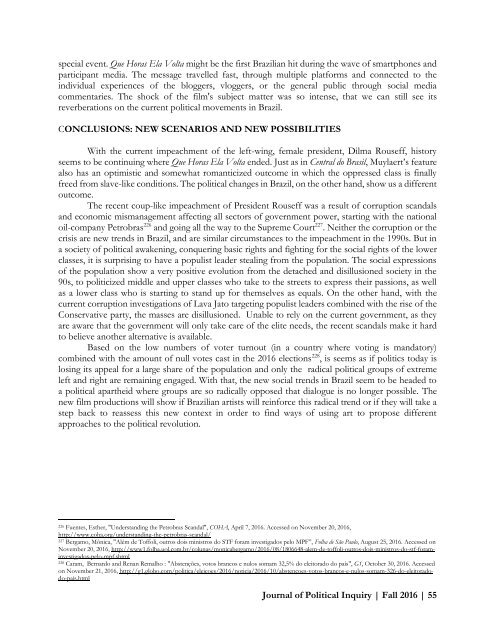Fall2016_Final
You also want an ePaper? Increase the reach of your titles
YUMPU automatically turns print PDFs into web optimized ePapers that Google loves.
special event. Que Horas Ela Volta might be the first Brazilian hit during the wave of smartphones and<br />
participant media. The message travelled fast, through multiple platforms and connected to the<br />
individual experiences of the bloggers, vloggers, or the general public through social media<br />
commentaries. The shock of the film's subject matter was so intense, that we can still see its<br />
reverberations on the current political movements in Brazil.<br />
CONCLUSIONS: NEW SCENARIOS AND NEW POSSIBILITIES<br />
With the current impeachment of the left-wing, female president, Dilma Rouseff, history<br />
seems to be continuing where Que Horas Ela Volta ended. Just as in Central do Brasil, Muylaert’s feature<br />
also has an optimistic and somewhat romanticized outcome in which the oppressed class is finally<br />
freed from slave-like conditions. The political changes in Brazil, on the other hand, show us a different<br />
outcome.<br />
The recent coup-like impeachment of President Rouseff was a result of corruption scandals<br />
and economic mismanagement affecting all sectors of government power, starting with the national<br />
oil-company Petrobras 226 and going all the way to the Supreme Court 227 . Neither the corruption or the<br />
crisis are new trends in Brazil, and are similar circumstances to the impeachment in the 1990s. But in<br />
a society of political awakening, conquering basic rights and fighting for the social rights of the lower<br />
classes, it is surprising to have a populist leader stealing from the population. The social expressions<br />
of the population show a very positive evolution from the detached and disillusioned society in the<br />
90s, to politicized middle and upper classes who take to the streets to express their passions, as well<br />
as a lower class who is starting to stand up for themselves as equals. On the other hand, with the<br />
current corruption investigations of Lava Jato targeting populist leaders combined with the rise of the<br />
Conservative party, the masses are disillusioned. Unable to rely on the current government, as they<br />
are aware that the government will only take care of the elite needs, the recent scandals make it hard<br />
to believe another alternative is available.<br />
Based on the low numbers of voter turnout (in a country where voting is mandatory)<br />
combined with the amount of null votes cast in the 2016 elections 228 , is seems as if politics today is<br />
losing its appeal for a large share of the population and only the radical political groups of extreme<br />
left and right are remaining engaged. With that, the new social trends in Brazil seem to be headed to<br />
a political apartheid where groups are so radically opposed that dialogue is no longer possible. The<br />
new film productions will show if Brazilian artists will reinforce this radical trend or if they will take a<br />
step back to reassess this new context in order to find ways of using art to propose different<br />
approaches to the political revolution.<br />
226<br />
Fuentes, Esther, "Understanding the Petrobras Scandal", COHA, April 7, 2016. Accessed on November 20, 2016,<br />
http://www.coha.org/understanding-the-petrobras-scandal/<br />
227<br />
Bergamo, Mônica, "Além de Toffoli, outros dois ministros do STF foram investigados pelo MPF”, Folha de São Paulo, August 25, 2016. Accessed on<br />
November 20, 2016, http://www1.folha.uol.com.br/colunas/monicabergamo/2016/08/1806648-alem-de-toffoli-outros-dois-ministros-do-stf-foraminvestigados-pelo-mpf.shtml<br />
228<br />
Caram, Bernardo and Renan Remalho : "Abstenções, votos brancos e nulos somam 32,5% do eleitorado do país", G1, October 30, 2016. Accessed<br />
on November 21, 2016, http://g1.globo.com/politica/eleicoes/2016/noticia/2016/10/abstencoes-votos-brancos-e-nulos-somam-326-do-eleitoradodo-pais.html<br />
Journal of Political Inquiry | Fall 2016 | 55
















